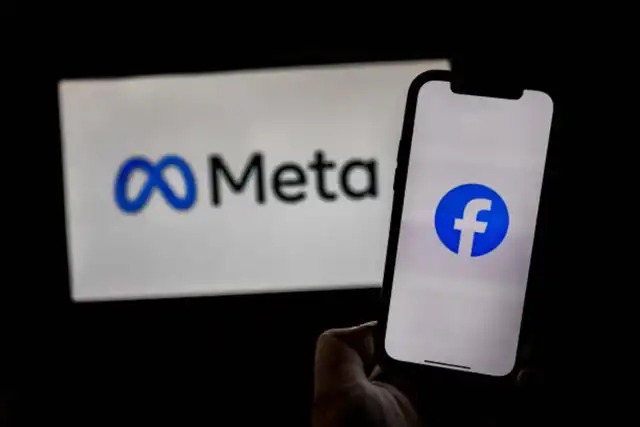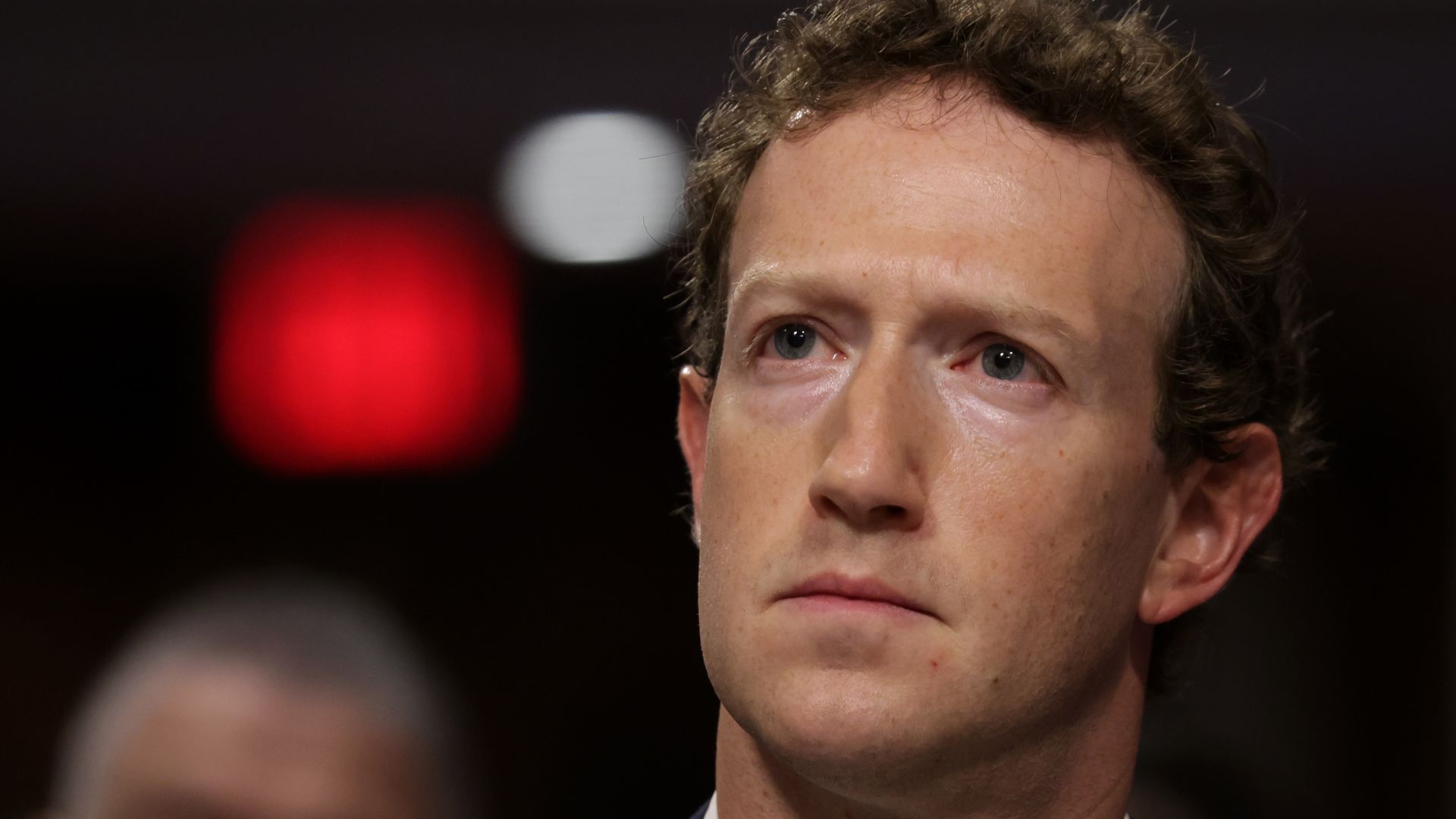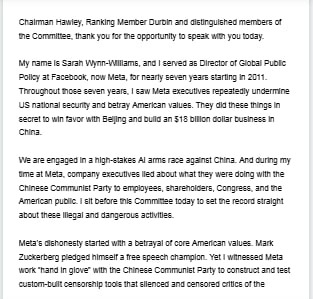
Sarah Wynn-Williams, a former Facebook employee who alleged misconduct and sexual harassment at the company in a memoir published last month, will testify before Congress on Wednesday that Meta executives undermined U.S. national security and briefed Chinese officials on emerging technologies like artificial intelligence.
In her introductory statement, obtained by NBC News, Wynn-Williams will tell the Senate Judiciary Subcommittee on Crime and Counterterrorism that Meta executives “lied about what they were doing with the Chinese Communist Party to employees, shareholders, Congress, and the American public.”
“I saw Meta executives repeatedly undermine US national security and betray American values,” she will say, according to the prepared remarks. “They did these things in secret to win favor with Beijing and build an $18 billion dollar business in China,” her statement says, referring to China-based advertisers.
Wynn-Williams, a former New Zealand diplomat, worked at Facebook from 2011 to 2017. She believes she was fired in 2017 as retaliation for accusing her boss, Joel Kaplan, who at the time was a vice president for global public policy, of sexual harassment. Meta, which owns Facebook, said that an investigation cleared Kaplan in 2017 and that Wynn-Williams’ book, “Careless People,” included “false accusations about our executives.” Meta also said other claims in the book were “out-of-date and previously reported,” and a former supervisor said she was fired for performance reasons.
In a statement Tuesday night, Meta spokesperson Andy Stone criticized Wynn-Williams’ planned remarks.
“Sarah Wynn-Williams’ testimony is divorced from reality and riddled with false claims,” Stone said in a statement. “While Mark Zuckerberg himself was public about our interest in offering our services in China and details were widely reported beginning over a decade ago, the fact is this: we do not operate our services in China today.”
Wednesday’s hearing is an indication of the scrutiny that Meta continues to receive in Washington, despite a monthslong effort by Meta and its CEO, Mark Zuckerberg, to pivot the company’s politics to the right, aligning more closely with the Trump administration and the Republican-controlled Congress.

Sen. Josh Hawley, R-Mo., a fierce critic of the major tech platforms who is chairing the hearing, said earlier this year that conservatives should not trust the Big Tech companies simply because some of their leaders, including Zuckerberg, have now more openly embraced President Donald Trump.
“No, I don’t think so for a second,” he said. “I’m deeply concerned about their monopolistic power. That hasn’t changed at all, their ability to turn right back on the control of news and information, their control over our personal data — none of that has changed.”
Separately, Meta is preparing for another major fight in Washington next week, when the company is scheduled to go to trial against the Federal Trade Commission in an antitrust case that could potentially see the breakup of Meta if it loses. The company owns Facebook, Instagram, WhatsApp and Messenger.
Meta has sought to stop Wynn-Williams from speaking about her book, winning an interim decision last month from an arbitrator finding that she violated a nondisparagement clause in her severance agreement. The arbitrator ordered her to cease promoting her book and retract claims she had made that were “disparaging, critical or otherwise detrimental.”
But her book has still become a hit, with three weeks on The New York Times’ bestseller list for nonfiction books.
In her introductory statement for Wednesday’s hearing, she wrote that she was testifying despite the arbitrator’s order because “the American people deserve to know the truth.”

Stone, from Meta, said that while the company objects to Wynn-Williams’ giving media interviews, the company’s position is that she’s not barred from testifying before Congress, by either her separation agreement or the arbitration award.
Wynn-Williams is expected to face questions both about Meta’s past and about its future plans, including with China and artificial intelligence.
“Facebook’s secret mission to get into China was called ‘Project Aldrin’ and was restricted to need-to-know staff,” Wynn-Williams is set to say in her testimony. “There was no bridge too far. Meta built a physical pipeline connecting the United States and China. Meta executives ignored warnings that this would provide backdoor access to the Chinese Communist Party, allowing them to intercept the personal data and private messages of American citizens. The only reason China does not currently have access to US user data through this pipeline is because Congress stepped in.”
The “physical pipeline” she mentions is a reference to a plan Facebook and Google announced in 2016 to build an undersea internet cable connecting Hong Kong and Los Angeles. They abandoned the Hong Kong portion of the idea in 2020.
Wynn-Williams will add that Meta began “briefing” Chinese officials “as early as 2015.”
“These briefings focused on critical emerging technologies, including artificial intelligence,” she will say. “The explicit goal being to help China outcompete American companies. There’s a straight line you can draw from these briefings to the recent revelations that China is developing AI models for military use, relying on Meta’s Llama model. Meta’s internal documents describe their sales pitch for why China should allow them in the market by quote ‘help[ing] China increase global influence and promote the China Dream.’”
Wynn-Williams appears to be referencing a report from Reuters published in November that said researchers linked to China’s People’s Liberation Army said that Meta’s Llama was used to build an AI tool for potential military use. At the time, a Meta spokesperson said that any use of Llama by the People’s Liberation Army would violate its policies.
In her book, Wynn-Williams said Facebook ignored concerns about expanding into China and plowed ahead with its efforts, writing that Zuckerberg committed to the idea of re-entering China in 2014 to grow the company’s user base. But by 2019, Zuckerberg said he had largely given up on breaking into the Chinese market because it was too difficult to come to an operating agreement. The company ultimately never released a mainstream consumer app in China.
In a 2019 speech, Zuckerberg all but ruled out the possibility and pivoted instead to attacking China’s record on free expression.
“I wanted our services in China because I believe in connecting the whole world and I thought, maybe we could help create a more open society,” he said. “This is something that I worked hard on for a long time. But we could never come to agreement on what it would take for us to operate there, and they never let us in.”
But Wynn-Williams, in her testimony, will challenge Zuckerberg’s credibility on issues of free speech. Various parts of the “Project Aldrin” effort, named for astronaut Buzz Aldrin, have leaked over time. That includes the building of China-specific censorship tools.
“Meta’s dishonesty started with a betrayal of core American values,” she will say, according to the advanced copy of her remarks. “Mark Zuckerberg pledged himself a free speech champion. Yet I witnessed Meta work ‘hand in glove’ with the Chinese Communist Party to construct and test custom-built censorship tools that silenced and censored their critics.”


